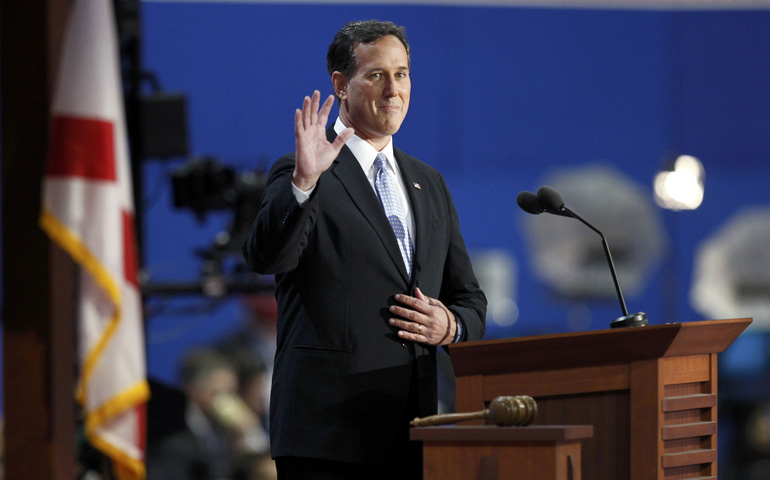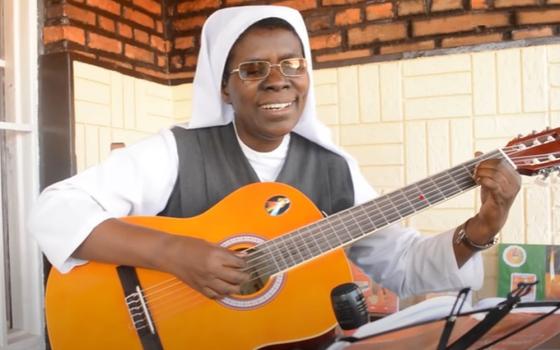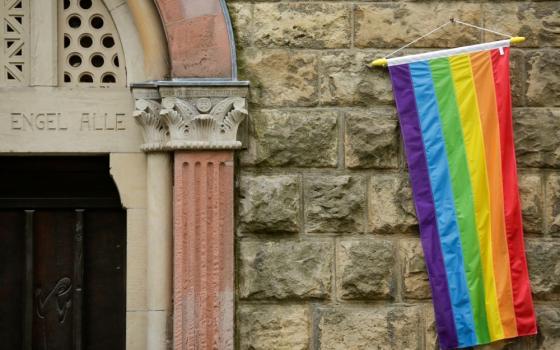
I had the opportunity to interview former presidential candidate Rick Santorum by phone Oct. 22 about his new role as CEO of a faith and family media company, EchoLight Studios, and its first Christmas film, "The Christmas Candle," a historical drama that takes place in England around 1900, which opens in theaters Friday.
NCR: Rick, you are the CEO of EchoLight Studios. How did you get involved?
Santorum: During my campaign for president, I met a man in Texas who hosted a fundraiser in his home for me, and after the election, we stayed in touch. He talked to me about an investment idea, a studio that distributed Christian films. I was interested, and the more I got involved, well, they offered me the CEO position this past summer.
Why did you accept this position?
I have always felt like someone who is involved in the culture and that it's important to have an impact on the culture. But I kept running up against how pop culture is changing the moral imagination of children and everyone. I wanted to get engaged in telling our story and not just let others tell theirs. [If we let this happen] then we are not holding up our end with the new evangelization. Talking on a street corner is not working today. As CEO of EchoLight Studios, it's a unique opportunity to change hearts and minds and souls.
What's the best part of your new role?
To produce and distribute these kinds of films -- this is the exciting part. Because EchoLight is a spinoff of an existing company [Group 1200 Media], we have a platform to distribute motion pictures on multiple platforms, TV and DVD streaming especially, and produce them, too. Group 1200 Media is a small content distribution company based in Texas whose real niche is taking content from Japan and distributing it in the U.S. We are able to use their expertise and existing connections, though EchoLight has theatrical releases as well.
What is your role in the new film coming out for Advent, "The Christmas Candle"?
My job with this project is to create this part of our company that does theatrical releases.
Do you see EchoLight as speaking primarily to the Christian Protestant audience?
When I first came to the company, it was very evangelical and focused on the Protestant market. But I call myself an evangelical Catholic along the lines of George Weigel, and I want to produce and distribute authentic content that tells faith stories -- period. "The Christmas Candle" is an Advent movie, and for all the liturgical Christian churches, it is an opportunity to unite the body of Christ because the film speaks to all Christians. And Christmas does unite and should unite all of us.
We will make stories from all perspectives, true stories from the evangelical world. But most of all, we are looking for good quality content that inspires and shows the true, the good and the beautiful when it comes to faith.
I read online a statement from Christopher Morrow, the chief global strategist for your company, that EchoLight has committed $1 million to the 168 Film Project here in Southern California. From my experience, this is a predominately Protestant Christian project, though some Catholics have been involved.
Since that statement, Morrow has left the company. However, we committed up to $1 million, with a minimum of $250,000, to a worthy project from this organization. This commitment was agreed to before I came on as CEO, and we will stand by this commitment.
Any other partnerships?
We also set up a partnership with Liberty University, a five-year contract to make a movie a year. We want to give students the opportunity to make good films. We bring in the talent and director, they provide equipment and support. We want to create a lot of content and help train believing filmmakers to the extent that we can. These won't be theatrical releases but for TV or particular TV stations.
Liberty University is an evangelical school. Loyola Marymount University here in Los Angeles has, as far as I know, the only Catholic film and television school in the world. Would you be open to collaborating with them?
Hollywood doesn't do faith, and when they do it, they don't do it well. Our niche is to tell faith stories, and we want to be successful. Loyola Marymount has a reputation in the industry, and we would be delighted to talk to them.
How do you see great content and economic success working together in the Christian market EchoLight focuses on? How does this make good art? Because what you are saying sounds like Sunday school in a can.
You cannot make art unless you are successful. You have to produce for a market, and I don't see this as betraying art at all. You see Hollywood as making some art, but they make other things that make enough money to pay for these. We don't have that luxury.
Someone once said, "If it's good art, it will be good theology, and if it is good theology, it will be good art." Do you think that EchoLight films so far meets this standard?
Everything going forward will meet the standard of good art and good theology. I can take responsibility for things coming out under my watch. Not everything is targeted for theatrical release but for TV, but there will be a clear reason for doing so, like those productions coming from Liberty University or "Seasons of Gray" from the Watermark Community Church in Dallas. We are distributing this. It's not a big production, but it is a well-produced, nice little story. It has some flaws, but it's not a Hollywood production. So is it good art, then? Not great.
Why Dallas? Why not Hollywood?
Our sister company, Group 1200, was based in Dallas, but I am happy in Dallas, and if I had my druthers, I would not move from Dallas. It has a good business environment. It's one of the few towns where people who have resources are overwhelmingly in sync with what we are trying to accomplish at EchoLight Studios. It's been relatively easy to raise money and easier for people to give money when their peers affirm them. It's not in Los Angeles, where your peers do not support you and will make you pay a price for supporting these values.
What are your hopes going forward?
My hope is to create a faith-oriented video industry, a headquarters. I hope we have a lot of competition going forward, and we can grow this niche.
Even though "The Bible" miniseries came from Hollywood?
That's the Bible. Hollywood has always made Bible movies and will continue, and this is fine. But what we are doing is a whole different kettle of fish -- to make stories where faith intersects with the characters' lives, to show how authentic faith impacts people's lives today. You'll see Hollywood do a lot of Bible stories and hopefully they will do them well, and hopefully they be faithful to the story. But Hollywood won't make movies about authentic faith in the world today.
What about "The Nativity Story" that came out in 2006?
It's the Bible. Hollywood will do all the biblical stories they want, but they are not making movies showing faith in the world today. Name one movie for me that is not a Bible movie that is about some struggling with their Christian faith.
"The Bishop's Wife" -- the original was with Cary Grant and Loretta Young and was remade with Denzel Washington and Whitney Houston.
I haven't heard of those.
How are faith and family films the same or different?
There are family films that have nothing to do with faith, but EchoLight will have faith films that will be family-friendly. "The Exorcism of Emily Rose" is a film I love but not a family film. I want to be a kind of Pixar studio that produces good, quality inspirational movies and TV shows that I can take my family to. We are not going to make great edgy films, but there is a need out there to affirm families and faith that won't make fun of them or the things they teach their children.
"The Christmas Candle," EchoLight's Christmas film -- what's the best thing you like about it?
It takes place in Advent, and I think it's the first Christmas film to do so. The message I like the most, the climax, is [that] the miracle is receiving the gift that is the Christmas season. The candles are beautiful sacramentals, and the blessing of the candle is beautiful in the film, but all the people in the village asked and prayed for a Christmas miracle. By doing this, they affirmed the most important miracle that Jesus is Lord and has come to earth to bring us to heaven.
The secondary thing is: Once you receive the miracle, you can be the miracle.
Why wasn't Susan Boyle, who has a starring role in the film, given more opportunity to sing?
Making this film was a really stepping-out for her. We didn't produce the film, so you'd have to ask the producers why. I know that they let her do as much as she felt comfortable doing. They are so pleased that she participated in the film.
I am a fan of Susan Boyle. Do you foresee a project where her singing could be showcased?
I don't know. There's nothing on our plate yet, but I wouldn't mind seeing something. She's very sweet and popular and in line with the very genuine values we are trying to promote.
Why should people see "The Christmas Candle"?
I am excited because this is a movie that is centered on people struggling with their faith in a season when people struggle with their faith. It's about a pastor who has lost his faith and a young woman, Emily, who has no faith. He was a "doubting Thomas" until the very end, and when Emily reaches in and says, "I have three matches," she's saying, "I believe."
Will EchoLight be sensitive to women as main characters and showing different ethnic groups in the films and television programs you produce or distribute?
"Seasons of Gray" does this, I think. But we are going to be open to doing stories that women will watch because the traditional audience, especially in the evangelical space, for these films is women.
We are going to tell good stories.
[Sr. Rose Pacatte, a member of the Daughters of St. Paul, is the director of the Pauline Center for Media Studies in Los Angeles.]




